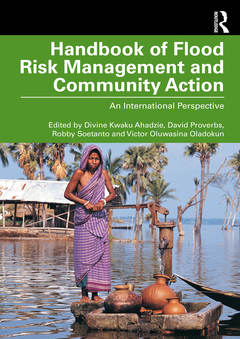Handbook of Flood Risk Management and Community Action An International Perspective
Coordonnateurs : Ahadzie Divine Kwaku, Proverbs David, Soetanto Robby, Oladokun Victor Oluwasina

Recurring and worsening flood incidence around the world has necessitated the understanding and strengthening of community-based flood risk management from an international perspective.
This handbook emphasises the need for community action as part of an integrated flood risk management approach, highlighting case studies that have received recognition and made positive impacts, resulting in resilience-enhancing actions which can improve global community understanding.
The content has been arranged such that it covers flood risk management approaches in the three main interfaces of before, during and after the flood event. Experts writing on case studies from Africa, Oceania, Europe, Asia and the Americas come together to present lessons from regional and continental experiences that will be useful in providing an understanding of the nature and effectiveness of the human-centred approach. The successful implementation of local and scientific knowledge as complementary measures is also highlighted in a systematic review on the use of technologies for flood risk reduction. This interesting and diverse range of contributions seeks to showcase opportunities for cross-cultural knowledge transfer and uptake in the field of flood risk management.
This handbook is essential reading for researchers, policy makers and leaders involved in flood and disaster management in the built environment, risk assessment, environmental and civil/construction engineering and community action planning.
1. Handbook of flood risk management and community action: An international perspective. 2. Co-production of knowledge for flood risk management: Case study of multiple stakeholders at Pekan, Pahang, Malaysia. 3. Local knowledge’s roles for nature-based solutions as flood risk M=management: Pangpang Bay, Indonesia. 4. Preserving heritage, historical artefacts and culture for social resilience and tourism amid flood disasters: A case study of Morten Village of Sungai Melaka, Malaysia. 5. Managing emergencies – failure and success: Lessons from a village in the Czech Republic. 6. Drivers, services gaps and improving disaster management for displaced people: A case study of prolonged displacement following the 2022 floods in Lismore, Australia. 7. Capturing the effectiveness of early warning and sustainable community-based early action interventions for disaster risk reduction in Bangladesh: An analysis from flood-prone areas. 8. Emergency animal-safe facilities assessment to enable livestock evacuation during disasters in Australia. 9. Home owner/occupant property flood protection: An appraisal of the options and opportunities used to mitigate and minimise impacts. 10. The prevention policy and experiences of flood resilience in Brazil. 11. Building resilience through community-based flood risk management: Pathway and reflections. 12. Flood insurance uptake in Nigeria; building resilience by promoting a culture of risk protection. 13. Community flood insurance in Ghana; individual and institutional diffusion of uptake. 14. Technology-mediated flood risk management tools: A review of smart and mobile applications. 15. River naturalization and load sediment detection sensor for community-based flood risk management in Indonesia. 16. Towards flood resilient supply chain systems: A facility location model for flood prone communities. 17. Conclusion and final remarks.
Professor Divine Kwaku Ahadzie is an experienced award-winning researcher in Construction and Human Settlement Development. He is the Head of the Centre for Settlements Studies at the Kwame Nkrumah University of Science and Technology, Kumasi, Ghana with a demonstrated history of working in construction, housing and disaster risk reduction.
Professor David Proverbs is Dean of the Faculty of Science and Engineering at the University of Wolverhampton, UK. He has over 25 years of experience in higher education and has held strategic leadership roles in three modern universities where he has championed student learning as a research-driven, curriculum active and enterprising academic.
Robby Soetanto is Reader in Construction Innovation Management and Programme Leader of Construction Engineering Management in the School of Architecture, Building and Civil Engineering, Loughborough University, UK.
Victor Oluwasina Oladokun is a Professor of Industrial and Production Engineering at the University of Ibadan, Nigeria, a Senior Fulbright Scholar and a Commonwealth Academic Fellow.
Date de parution : 12-2023
17.4x24.6 cm
Thèmes de Handbook of Flood Risk Management and Community Action :
Mots-clés :
Climate change; flood risk; community action; resilience; adaptation



